Activism

I WAS SWIMMING with friends in a creek when our host led us to a waterfall where a blanket of water dumped into a deep pool. The only way to get to the small cavern behind the fall was to swim below the churning surface. My friends dove under and popped up happily behind the curtain of water. I tried, but the water pounded my back and pushed me back to where I started. The next time, I approached it sideways and reached out my hand for a friend to pull me through.
This memory was fresh when I talked with Ashley M. Jones, poet laureate of Alabama. Her latest book Lullaby for the Grieving is a collection of poems that plumb the depths of grief over her father’s passing as well as grief for the horrors of slavery in American history and ongoing genocide in Gaza.
She told me the title came during a workshop that poet Palavi Ahuja led along the Sipsey River in western Alabama. After a hike, Ahuja asked participants to write a lullaby. For Jones, a lullaby is less about how to get to sleep, and more about “describing where you are ... where you could be and giving you a pathway to pause.”
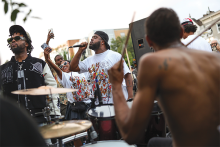
Those of us who live in the District of Columbia grow accustomed to watching major events unfold in our city. But the hyped-up “crime emergency” President Trump declared in Washington, D.C. in August was different.
An alphabet soup of federal law enforcement officers—DEA, FBI, Park Police, U.S. Customs and Border Protection, ICE—joined National Guard troops and our police force to set up checkpoints, patrol neighborhoods, and arrest people for some felonies, yes, but according to an NPR report, mainly misdemeanors, traffic offenses, or charges that were later dropped. Friends and neighbors shared chilling footage of aggressive immigration enforcement; one friend described the helpless feeling after watching ICE surround a car, break a window, and snatch a neighbor.
We are not the first U.S. city this year to face armed soldiers (we see you, L.A.) or the last. But D.C. has fewer official means to push back: The District only gained “home rule” in 1973 and Congress can—and does—override laws approved by our council or voters. The president can also intercede in our affairs.
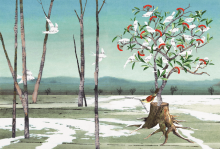
Many of us have made homes in religious traditions where we have found collective love, care, community-building, and resilience. But so much of what passes as spiritual in the United States — churches who only see their work as therapeutic, prosperity gospel proponents, white evangelical nationalists, New Age movements — is commodification by other means. John warns us against false prophets who, through quick fixes and distorted spiritual comforts, foster division and confusion in the service of lucrative self-aggrandizement.
I am an ordained minister in the Fellowship of Affirming Ministries, and I work as a movement chaplain in Los Angeles. I was trained as a spiritual director, and I have been doing ministry with faith-rooted activists since 2016. My work is informed by my primary training as a medical anthropologist and community researcher. I know that Jesus said that we humans are of more value than many sparrows, but I’ve found that we are a lot like them. We need refuge and sustenance. We need shelter. We need to nest somewhere. But with whom shall we do this for the short and long haul? And where shall we build our nests?
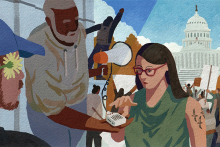
A DELIGHTFUL DISCOVERY I made while researching a countercultural Christian community in Washington, D.C., was the book Gifts of Grace by Mary R. Schramm. In 1965, Mary and her husband, John, started the Community of Christ. The community intentionally wove together a deepening faith, activism for peace and justice, and shared life with other Christians from the raw starting material of honoring each person’s unique contribution. Discerning each one’s gifts was a way of learning about God’s will for their lives, individually and collectively. “I don’t care whether you’re 8 or 80,” Schramm wrote, “you are responsible for finding out the things that God would have you do.” To do that, she encouraged paying attention to what one enjoys. “I don’t think God gave you a gift or an ability to make you miserable,” Schramm said in a talk about her book. “God made us to be fulfilled by the gifts that God gave us.”
The idea of “being called” by God can be intimidating. It can also be misused — for example, when someone is convinced that they should determine what your calling is or is not, or when someone erects barriers to exclude the callings of others. An intimation of God’s call can also spur feelings of self-doubt or unworthiness, as it did initially for the prophets Isaiah and Jeremiah. Yet, in their stories we see a God who chooses individuals and calls them amid their struggles. What might be perceived as a weakness can be turned into a strength through the gift of God’s grace. Imagine! A God who wants us just as we are.

IN HIS BOOK God’s Politics, Jim Wallis tells the story of his trip to South Africa during the apartheid era. During his trip, Wallis attended an ecumenical service at St. George’s Cathedral in Cape Town. While Archbishop Desmond Tutu was preaching, South African police entered the church — carrying recording devices to monitor for any anti-government sentiment — to intimidate the congregation and the anti-apartheid activists. Undeterred, Tutu reportedly continued to preach joyfully, becoming even more passionate in his truth-telling against apartheid. Moments later, the crowd spontaneously erupted in dancing and celebration.
Joy, in the form of dance, may have seemed inappropriate for the moment, but it was really a coded form of resistance and revolution. Even if dancing is not our forte, there is something we can learn from the way the congregation used this subversive, embodied art form.
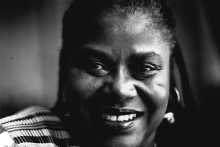
I WAS VISITING my sister and niece in Maine with my middle daughter when we learned that Dr. Bernice Johnson Reagon died. Our aunt in Oakland sent the obituary to our mom in Ohio, then Mom texted us: “Thought immediately of you both and all that she and her music meant to us. Long, lovely memories.”
Even in the news of her passing, Reagon, the founder of the celebrated music ensemble Sweet Honey in the Rock, was connecting women across generations, geography, religious, and racial categories. The music of Sweet Honey helped my mom, a white Quaker woman and Methodist pastor from rural Ohio, find her voice. It also shaped my sister and me as biracial Black women growing up in Washington, D.C. in the ’80s and ’90s. I took a course from Dr. Reagon during my senior year in high school. I never saw her again. Waves of grief and gratitude washed over me.
The day we got the news, we woke in a tent after camping near where the sun rises first over North America. As we drove past towering pine trees, taking in the news of one more passing — each death stirs up the sadness of all the other losses and more to come — my sister and I played our favorite Sweet Honey songs. We sang along to Reagon’s “I Remember, I Believe” from the 1995 Sacred Ground album: “My God calls to me in the morning dew / The power of the universe knows my name / Gave me a song to sing and sent me on my way / I raise my voice for justice, I believe.”
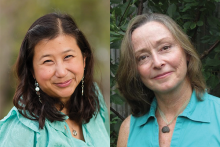
DORCAS CHENG-TOZUN, author of Social Justice for the Sensitive Soul (Broadleaf), wanted to be an “unceasing voice” for social justice. “And while I was busy saving the world,” she writes, “I would also be the kind of person who’d happily sacrifice anything for a good cause.” But 10 months after Cheng-Tozun moved from the U.S. to China to set up an operations office for her spouse’s solar business, thrilled at the possibility of providing affordable electricity to billions of people, she experienced the “worst and longest panic attack” of her life. For more than a year, she could do “little more than sleep and cry and journal.” A crucial, difficult question arose: “Why can’t I handle what everyone else seems to be managing perfectly well?”
For Trish O’Kane, author of Birding to Change the World (Ecco), the breaking point was Hurricane Katrina, which destroyed her New Orleans home and neighborhood. “After a disaster,” O’Kane reflects, “you just can’t do as much. Nor should you. You need time to think, to ponder ... I needed a great slowing down.” She took up knitting, spent long hours outdoors on the ground “watching the clouds change shape and bumblebees loading their back legs with pollen and the yard birds going about their business.
Like Cheng-Tozun’s year of sleeping, crying, and journaling, these months surfaced life-changing questions for O’Kane. “I could feel my question changing,” O’Kane writes, “from What should I do? to How should I be?”
In their respective books, Cheng-Tozun and O’Kane write from the other side of activist burnout — something Cheng-Tozun experienced after working for multiple social justice organizations, and O’Kane after working in human rights journalism in conflict areas, both for many years. Both writers ponder how to change, heal, and move forward. Birdwatching was the gateway for O’Kane, while Cheng-Tozun found herself reflecting on sensitivity, introversion, and the many ways people are wired with different gifts to offer. They have different backgrounds and stories — Cheng-Tozun is now a writer and consultant who most recently worked for a Christian nonprofit that equips BIPOC contemplative activists; O’Kane is an environmental educator who created the “Birding to Change the World” program at University of Wisconsin-Madison — but both authors offer a similar invitation to those who yearn to make a difference: Learn to embody gentler, more sustainable ways of doing so.

On my first trip to Cuba in 2022, I met Jorge González Nuñez, president of the Movimiento Estudiantil Cristiano de Cuba (MEC). I asked how he would describe the situation the Cuban people were living in, impacted by the U.S.’ decades-old trade embargo and other policies introduced by the administrations of former President Donald Trump and President Joe Biden, from a theological perspective. His answer stuck with me.
“The Cuban people are going through a crucifixion,” he said without hesitation. “It is hard to have hope.”
He paused and then added, “But there is resurrection.”
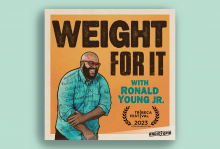
Bodies of Thought
In the podcast Weight For It, host Ronald Young Jr. explores “the nuanced thoughts of fat folks, and of all folks who think about their weight all the time.” These vulnerable, reflective episodes carefully address how fatness intersects with topics such as gender and health care. Radiotopia

“Something I often heard was that ‘there’s not enough Black Catholics.’ [That] the numbers of Black Catholics are not big enough to justify doing a survey into this community. But that was in complete contradiction with what I was seeing when I was at these rallies and with people who were engaging with the Black Lives Matter movement.”
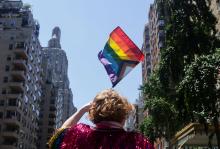
The current discourse around right-wing politics and religion has been focused on the phrase “Christian nationalism.” Christian nationalism is a catchall for a variety of beliefs that generally claim the U.S. is founded upon Christian ideas and that the country’s current laws ought to reflect those beliefs. Rep. Marjorie Taylor Greene (R.-Ga.) is perhaps one of the most well known politicians in the U.S. who identifies as a Christian nationalist, but, according to a survey done by Pew Research, “Eight-in-ten White evangelical Protestants (81 percent) say the country’s founders intended it to be a Christian nation.” Christian nationalism, as a term, is fine but imprecise. What we’re seeing from lawmakers, like those in Missouri but also in other states, too, is more properly defined as “Christofascism.”

The June release of a Climate Vigil The Porter’s Gate Worship Project aims to nudge Christians toward climate action, but it isn’t alone among contenders to inspire the climate movement. For over 20 years, Carolyn Winfrey Gillette, a Presbyterian minister from New York, has written hymns for the times, including one for the 2021 UN climate talks held in Scotland and several to recognize increasing natural disasters such as wildfires, hurricanes, and floods. Fossil Free PCUSA, a campaign within the Presbyterian Church (USA) has used hymns in protests, including songs by Christian artist Matthew Black.
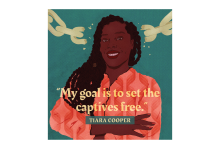
IN THIS MONTH'S cover feature, Lydia Wylie-Kellermann wrestles with one of the central dilemmas of parenting: the tension between protecting our children and empowering them for action. That tension is made more pointed, and the stakes elevated, by the crises we face—including, perhaps most urgently, climate change. Though I imagine that balance has been one of the more challenging aspects of raising children since the invention of parenthood.
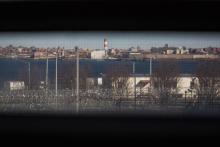
If we want to enact justice in any situation, we must listen to the voices of those directly impacted by the injustice. Those of us who served time on Rikers Island know firsthand why it has to close. Any movement for justice that is not led by directly impacted people is charity, at best, but it is not biblical justice. Biblical justice empowers, while charity can disempower if it is not coupled with justice.

Our greatest prophets took the time to ask that question often, and we can follow in their footsteps.
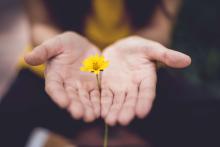
Contemplatives are people who seek the whole, and therefore, live in liminal spaces. So, what then does it look like for us to come up against systems that oppress? We stand against those systems, not because we are looking for a good versus evil duality, but because we recognize that oppressive systems do not see the whole, they themselves are working in dangerous dualities that dehumanize.

CAROLYN FORCHÉ’S story begins more than 40 years ago, when the then-27-year-old poet opens her apartment door in California to a stranger from El Salvador. Leonel Gómez Vides—“Leonel,” as she refers to him throughout her book—spends several days outlining the situation in his country and making his case for Forché to come witness the roots of a revolution.
That Forché accepts such a calling, from January 1978 through March 1980 and for more than 40 years beyond, attests not only to her grit but also to her belief in the sanctity of the human spirit and the power of truth.
An awakening usually connotes a positive state of consciousness, yet Forché’s experience calls her to a grim, nightmarish landscape. Once her plane touches down in Ilopango, El Salvador, she ventures into a world in which nearly one in 10 children dies before the age of 5 and 80 percent of the population has no running water, electricity, or sanitation. To read Forché’s rich prose is to travel alongside her through the jungle, where she learns to squat over open pits to relieve herself, and follow her into palatial, private quarters, where she washes away the filth of the road before meeting with the military and civic leaders who want her dead. Beyond the poverty, the country devolves into a hell wherein mutilated bodies appear in the streets and political prisoners are kept in small cages, like animals.

On Dec. 30, 1959, over 3,000 Christian students gathered in Athens, Ohio, at the 18th Ecumenical Student Conference. Participating youth leaders and activists developed methods of engaging with social and political transformations at the turn of the 1960s. One of the key speakers was a 30-year-old Baptist preacher who emphasized a religious as well as civic prerogative for students, claiming: “whenever a crisis emerges in history, the church has a role to play.” While the specific crisis Martin Luther King Jr. referred to was the fight for civil rights in the segregated American South, he urged Christian students to challenge injustice undergirding all systemic discrimination, oppression, and racism at home and abroad.

While the zeal and strategy of the Religious Right has been well-documented since the movement’s inception in the late 20th century, journalists have lately turned their attention to its alleged left-leaning counterpart. Stories, bearing equal parts documentation and speculation, of an emerging “Religious Left” have decorated the pages of major outlets such as the The New York Times, Washington Post, The Guardian, and Reuters since 2016. But the framing of these stories distorts as much as it uncovers.

Practicing silence can be counter-intuitive among progressive Jesus-followers who want to usurp the Trump-supporting, fear-mongering, Fox News version of Christianity. We’re emboldened to speak up and out, responding to next oppressive policy, the next breaking story, the next call to use our privilege to work on behalf of those who have little or none. But we risk something in this cycle: the development of a savior complex that loses touch with God’s direction of our call because we are too busy working to hear it.